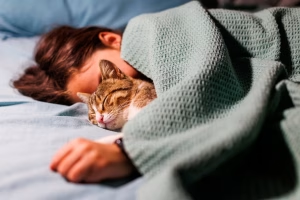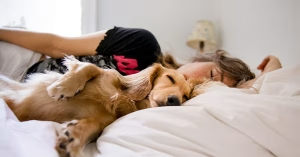Sleeping With Pets: Comforting or Risky?

How tightly connected is your relationship with your pet?
Are you kissing them often and sleeping in their bed at night? Specialists discuss this close relationship, because it can be good for both the owners and their pets, but could also cause health problems.
Conditions spread by pets
About 250 zoonotic diseases have been identified and over one hundred of these result from contacts with domestic animals.
Among the problems are:
You may find dirt brought home by your pet : They often enjoy playing outside. They may discover unpleasant things while out, .such as dead animals or other dogs and might bring ticks, fleas or a little dog poop (feces) into your home.

Also, having a pet might disturb the sleep of anyone sharing the bed, especially if they’re playing in the middle of the night. Pet noises at night may keep you from getting undisturbed sleep.
If you try to modify this behavior because another person has joined your family, it may be quite a struggle. Introducing them to sleeping by themselves may be difficult, since they’ll constantly drag you to their bed and start barking to come in with you.
Health problems associated with sleeping with dogs
Examples of these diseases are:

Allergies: Because lots of people are allergic, invasive pets can make things difficult for shared living. If you are allergic to dander, you won’t be able to sleep peacefully because pets often shed hair a lot.
Hookworm: Your dog, along with animals and humans, can get hookworm by a worm that lodges in the small intestine.
Respiratory health: Bacteria, dust and other particles found in our homes can lead to our dogs developing problems such as asthma.
We might infect humans through our dog by passing on intestinal parasites that can harm children’s health.
